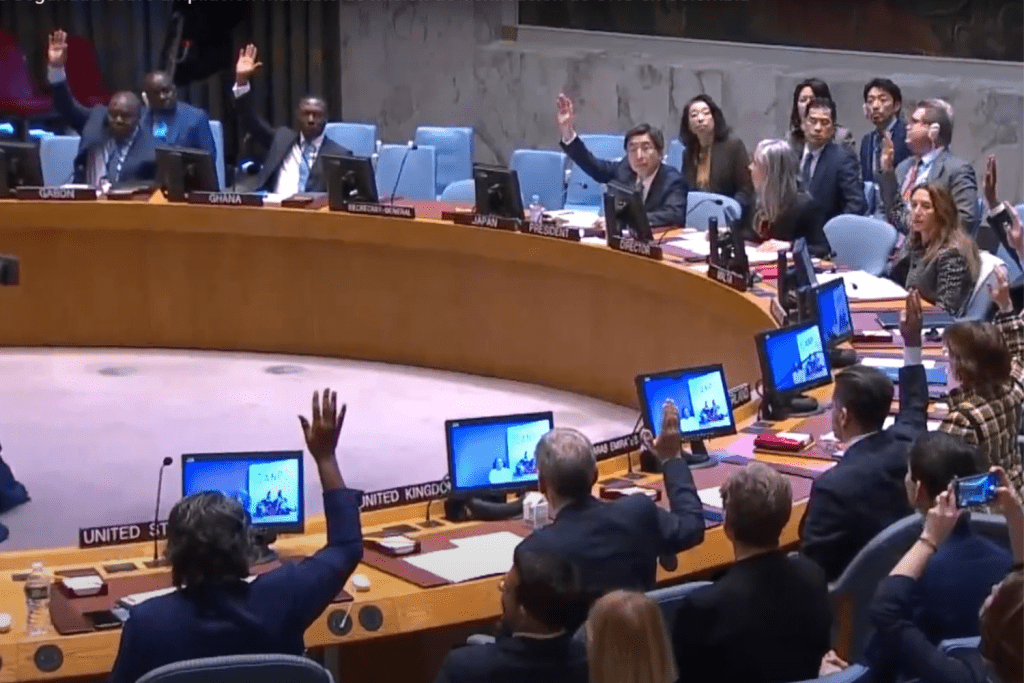At the UN Security Council in April 2025, Ambassador James Kariuki, UK Deputy Permanent Representative to the UN, highlighted the importance of fully implementing the Colombian 2016 Peace Accord to promote lasting peace in Colombia.
Colombia’s plan to implement a a Rapid Response Plan, committed to accelerate implementation and deliver real change in PDET areas – rural territories most affected by the conflict – is one that if implemented in an integral manner will enable the poorest in the most conflicted areas in Colombia to move away from illicit economies, gain access to land, to housing, and to basic services, thus helping to tackle the root causes of the conflict.
The UK also urged the Special Jurisdiction for Peace (JEP, Spanish Acronym) to move forward on the cases and to sanction those most responsible and issue reparative measures. The JEP process has been very slow leading to many social organisations being concerned about the limited timeframe remaining for completing all the cases, including through the issuance of long-awaited restorative sentences. The JEP recently outlined that it was taking steps to streamline internal procedures with a view to speeding up the process e.g. in January, it was decided that the different Special Jurisdiction components would collaborate more closely with information sharing to accelerate investigations in all macro cases.
There has been a rapid resurgence of the conflict in Colombia with different armed groups fighting for control of territory, trafficking routes and illicit economies. Communities are being terrorised, confined and unable to leave their territories, or forced to flee for their lives. Agreements like the Pact for Catatumbo provide a pathway for the Colombian Government to tackling this violence. They are being urged not only by the UK at the Security Council to implement this but also by local civil society organisations.

Statement by Ambassador James Kariuki, UK Deputy Permanent Representative to the UN, at the UN Security Council meeting on Colombia.
Last year, following President Petro’s intervention in the Council in July, we welcomed the government’s announcement of a Rapid Response Plan, which committed to accelerate implementation and deliver real change in the territories most affected by the conflict.
Communities in these areas expect the government to deliver on their urgent needs. We welcome Foreign Minister Sarabia’s commitment to accelerate the delivery of the agreement. This will require a whole of government effort with close coordination with regional and local authorities and of course, Colombia’s security forces, so that the impact is felt by those communities.
We remain concerned by the security situation in those territories, particularly for women, children and indigenous groups. The violence in Catatumbo is a clear example. We call on the government to strengthen protection measures and safeguard communities. We welcome the launch of the Pact for Catatumbo, and we urge the government to prioritise the security of all vulnerable Colombians through mechanisms already established.
This includes convening the Commission for the Follow-up, Promotion, and Verification of the Implementation of the Final Agreement (CSIVI) and delivery of the Women, Peace and Security National Action Plan published last year. With 23 peace signatories killed this year alone, and hundreds displaced, the safety, security and reintegration of all signatories to the agreement remains paramount.
President, justice for victims remains at the heart of the 2016 Agreement, with its carefully designed system of complementary institutions focused on truth, justice and reconciliation. We call on the Special Jurisdiction for Peace (SJP) to accelerate its work to ensure the confidence of victims and signatories.
To assuage growing doubts about the SJP and its efficacy, now is the time to move forward to the issuing of sanctions and to hold to account those responsible for the most serious human rights violations. The government has an essential role to play in coordinating with the SJP on the implementation of reparative measures.
Beyond the 2016 Agreement, we recognise the Colombian Government’s efforts to extend the dialogue to other armed groups. Unfortunately, as the Secretary-General’s report notes, these dialogues have not delivered the desired results.
The UK, and this Council, have consistently called upon those groups to demonstrate a genuine commitment to peace, above all by respecting the rights of the communities whose interests they claim to pursue.
Those communities continue, however, to be affected by serious violence, gross human rights abuses, and coercive and predatory behaviour at the hands of armed groups. If there is to be any hope of sustainable progress through dialogue, the groups involved need to show that they are serious about a political process.
President, to conclude, the United Kingdom remains steadfast in our support for sustainable peace in Colombia.
Published 22 April 2025
